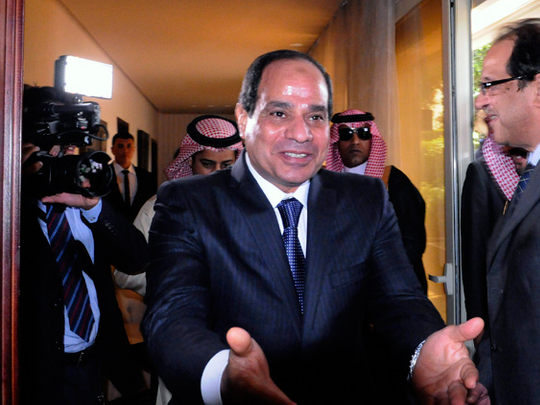
As expected, the Egyptian presidential elections ended with Field Marshal Abdul Fattah Al Sissi winning by a huge margin. The race was not about election programmes or any such agenda. It was about regaining the state, and stopping the malfunction. The majority of Egyptians had panicked as a result of the events over the past three years, and had seen state authority disappearing despite the fact that their entire history had revolved around a strong central state.
Egyptians prefer security and stability, even if it comes at the expense of democracy. That is the message they delivered at the polls. Many of the more enlightened young Egyptians refrained from voting; old people and middle class families constituted the majority of voters. The total percentage was very important to the new regime, to the extent that the state declared at the eleventh hour that the second day of election would be a holiday, in order to lure voters. When that did not make much difference, it declared a third day of voting, this time combining it with a penalty for some absentees, who would be fined 500 Egyptians pounds (Dh256) if they did not vote. All these efforts were probably made only to increase the percentage of the electorate, not to decide who would be the winner.
They had to outperform the numbers in the last Egyptian elections that brought Mohammad Mursi to power. The race this time was between Al Sissi and Hamdeen Sabahi, who has been a long-time fighter in Egyptian politics, and claims to be Nasserite in his political persuasions. He also says he represents the revolutions of January 25, 2001 and June 30, 2013 — against Hosni Mubarak and Mursi, respectively. Both Al Sissi and Sabahi could be considered to be from the centre-left of Egyptian politics. Their manifestos are almost identical. Both fought a soft campaign, which was not competitive. Hence, voters were not enthused.
Popular choice
What mattered to most voters was which of the two — Al Sissi or Sabahi — would be more likely to end what they saw as “chaos” on Egypt’s streets and the near collapse of the state structure. And the person with the military background, who was seen in action getting rid of Mursi on July 3, 2013, and prove his decisiveness in fighting “terrorism” was also seen as the man to lead in this time of uncertainty. Al Sissi was the popular choice; security trumps all other concerns.
But the story does not end there. There are many obstacles facing Al Sissi in office. The fragmentation of Egyptian society is the first. It is not easy to marginalise a large segment of the Egyptian political scene. Two are very obvious. First, the Muslim Brotherhood, that has been in and around Egyptian politics for almost eight decades. They are organised, inside and outside Egypt, and they pose a great challenge. They see Al Sissi as the new “dictator” who has come to power through a coup. The Brotherhood will be a thorn in the side for quite some time. The second are the so-called “young revolutionaries”. One of their group calls itself the April 6 movement. There are other splinter groups, mainly on the left. They are small in number but active in the media, especially new media and social networks. They are basically against military rule and see Al Sissi as an “autocrat” and not a democrat.
So, a sizable segment of Egyptian society needs to be brought onboard before things get better. Some Egyptian elites look suspiciously to the attitude of the Mubarak Men (they are called fulool in Egypt, literally meaning the “left overs”). A number of them where active, directly or indirectly, in Al Sissi’s campaign. So some Egyptians fear a return of old practices, especially corruption and nepotism. Some say Al Sissi is not naive to take the Mubarak Men on board. Even Mubarak, and his supporters in prison, asked that they be allowed to cast their ballots. But the authorities denied them this request, a sign that the new administration is different from the old one.
The most acute challenge to Al Sissi’s coming administration is the economy. A few days before elections, the interim authorities passed the biggest budget in Egypt’s financial history — more than 800 billion Egyptian pounds. A large percentage of this budget will go towards subsidies on food, energy, and essential consumer goods. Unemployment in Egypt stands at 14 per cent officially. About 20-30 per cent of Egyptians live below the poverty line, and the number is higher in the south. This is a great challenge for any administration. Add to that the huge bureaucracy that stands in the way of future investments, local and foreign. The bylaws adopted by successive governments after January 25, 2011, make it harder for investors to invest. They were intended to facilitate the crony capitalism of the Mubarak era. What has happened in Egypt so far was the easy part, what is coming is harder. The honeymoon period for republics of the so-called Arab Spring is very short indeed — and Egypt is no exception.
Mohammad Alrumaihi is a professor of Political Sociology at Kuwait University. You can follow him on Twitter at www.twitter.com/@rumaihi42








